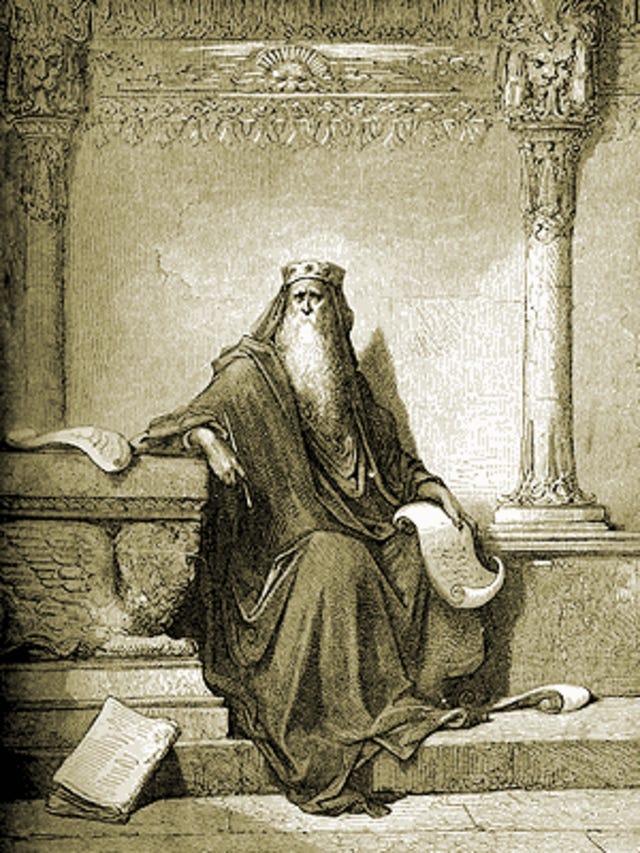Greetings friends! I’m happy to say that this newsletter will be resuming normal service again from this week. I have successfully moved house and been ordained, and have enjoyed the first month of my curacy. Thanks for bearing with me as I took this very helpful break!
This Sunday we have the rare treat of a reading from the book of Ecclesiastes. I will be preaching on this text, and I hope that if you’re preaching this newsletter might help you find your way into it.
Where did this strange text come from? How does it relate to other texts? What should we make of it? Read on to find out!
King Solomon. From Dore's illustrations for the Book of Proverbs.
Context: Where did Ecclesiastes come front?
The book of Ecclesiastes or ‘Qohelet’, referring to one who convenes an assembly, or perhaps ‘teacher’ in Hebrew, is a text which is quite unlike others. It reads like a soliloquy, and that gives us some sense of the time period in which it was likely to be written.
This kind of text, in a similar way to the book of Job, wrestles with some complex philosophical issues which lead scholars to believe that it was quite late. Traditionally, the book has been attributed to Solomon but the language suggests it was written quite a long time after the monarchic period. In particular, the text seems to have some Persian influence - seen in words such as that translated as ‘parks’ which is the Persian word pardes.
Another reason we think this text is likely to be post-monarchic (after the monarchy) is because it seems to have a fairly low view of kingship.
Chapter 2 says: ‘So I turned to consider wisdom and madness and folly; for what can the one do who comes after the king? Only what has already been done. Then I saw that wisdom excels folly as light excels darkness.’ (2:12-13).
This passage suggests that the writer lives in a context ‘after the king’ and the Persian influence on the language indicates that the book was written sometime after the exile, and likely in the Persian period.1
Content: What is Ecclesiastes?
The opening words of the book, ‘meaningless, meaningless’ or ‘vanity of vanity’: in Hebrew: ‘hevel hevelim’, set the tone for the rest of the book. The term ‘hevel’ has various shades of meaning, including breath and vapour. The sense is of something which is passing away and was barely here in the first place.
For the writer of Ecclesiastes or the ‘Teacher’, this is the very nature of human life. It passes away in the breeze. This isn’t dissimilar to some of the material we find in the Psalms, like 103:5 ‘The life of mortals is like grass, they flourish like a flower of the field’. Along with Job and Proverbs, Ecclesiastes has been considered to belong within the broad category of ‘wisdom literature. Though, unlike proverbs, it focuses not on instruction about how to live life well but rather on the bigger existential questions about life itself. For this reason, some scholars have preferred to think of Ecclesiastes as ‘protest literature’ rather than wisdom.2
Katherine Dell, a leading scholar on wisdom literature, suggests that Ecclesiastes and Proverbs are more closely related than we might think. She says: ‘The difference in Ecclesiastes is that [the proverbs] are often accompanied by an interpretation that qualifies the proverb in question, sometimes an additional comment…and sometimes a refutation or contradiction’.3 So perhaps we can think of Ecclesiastes as showing development in the wisdom tradition.
What, then, does Ecclesiastes have to say to us today?
In many ways, reading the book of Ecclesiastes is like having one long existential crisis. In some ways, though, the presence of this book in scripture provides a place to reflect on difficult feelings of doubt and uncertainty. Almost every person of faith will at some point experience these things, and perhaps the book of Ecclesiastes helps to make them less ‘taboo’ in church. By hearing the writer wrestle with these big questions, perhaps we can allow space to wrestle with them too, and in the end find God to be faithful amidst our doubts.
For a good overview of the arguments around dating, see the introduction of : (Bartholomew, Craig G.. Ecclesiastes. Grand Rapids: Baker Publishing Group, 2009)
R. Davidson, The Courage to Doubt, London 1983 and J.L. Crenshaw, A Whirlpool of Torment(OBT, 12), Philadelphia 1984.
Dell, K. J. (2016). "Ecclesiastes as Mainstream Wisdom (Without Job)". In Goochem in Mokum Wisdom in Amsterdam. Leiden, The Netherlands: Brill, p 44





